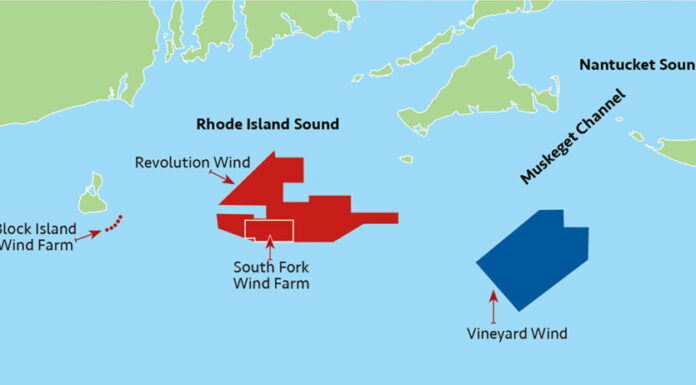
SOUTH KINGSTOWN – State coastal regulators have signed off on the South Fork Wind Farm project, providing the number of turbines is reduced and a compensation fund for local fishermen is set up.
The R.I. Coastal Resources Management Council’s 5-2 vote on Wednesday night ends a monthslong series of failed negotiations between the developer and fishing industry representatives, whose dispute centered on details of how the industry should be compensated for losses. Even on Wednesday, the latest CRMC staff recommendation attempting to strike a compromise between the two sides appeared to drive them further apart.
South Fork is being jointly developed by Danish company Orsted A/S and Boston-based Eversource Energy. Once completed, it will supply electricity to Long Island, N.Y.
The 132-megawatt wind farm slated for federal waters off the coast of Block Island still requires final approval from the U.S. Bureau of Ocean Energy Management. While the process for leasing and reviewing major offshore wind turbines largely rests at the federal level, the CRMC through its Ocean Special Area Management Plan gets a say for wind farm projects within a certain distance of the state coastline. Compensation is intended to offset losses to the fishing industry from the construction and operation of the projects.
The decision Wednesday gives the green light for the project to advance with a series of conditions, including cutting the number of turbines from 15 to 12 to minimize ecological and environmental harm, as was recommended in the staff report. The council will also require the developer to put $5.2 million into an escrow account to pay out claims for fishermen who incur losses from the project. The money will be paid upfront as one lump sum, though a prior proposal would have paid $12 million over the 30-year life of the project.
The Fishermen’s Advisory Board, which represents commercial, recreational and charter fishermen in the state, as well as onshore supportive activities, said $12 million in payment upfront was the only offer it would accept.
The format of the funding is what drew opposition from Council Chairwoman Jennifer Cervenka and member Ronald Gagnon, who cast the two “no” votes. Cervenka and Gagnon both said they supported approval of the project but wanted to have the money put into a trust fund controlled by the fishermen, similar to the funding agreement struck for the Vineyard Wind project.
“I worry about a third-party entity making determinations for the fishermen that’s akin to an insurance process,” Cervenka said. “I would rather it be the fishermen that are in control of those claims.”
The staff also recommended the trust fund option.
But Robin Main, an attorney with Hinckley Allen & Snyder LLP representing South Fork, likened the trust fund to a “war chest” for the industry, advocating for a compensation fund with a defined process through which fishermen file claims for losses and funds are doled out based on their claims. Main also questioned whether an upfront lump-sum payment would leave enough money to account for losses when the turbines are taken down in 30 years.
Meanwhile, Marisa Desautel, an attorney for the Fishermen’s Advisory Board, said both payment offers were based upon “severe and fatal economic flaws” with how much the projects would cost the fishing industry, and urged the council to deny the certification.
The divide over the project was also highlighted in public comments. Fishermen decried the damaging impacts the project would create for their industry and livelihoods, while environmental advocates warned of dire consequences for the delicate underwater ecosystem in Cox Ledge where the project is to be built.
Meanwhile, labor union representatives and business association leaders threw their weight behind the project, urging the council to look beyond price disputes to the big picture of job creation, economic growth and ambitious environmental goals dependent upon renewable energy.
The latest extension agreement between the CRMC and federal regulators gives the council until June 22 to submit its certification decision to BOEM. The council decision Wednesday also calls for the CRMC and developer to sign a separate agreement detailing how the compensation fund will work by the June 22 deadline.
(This story has been updated throughout to include the U.S. Coastal Resources Management Council’s vote result and comments from members Jennifer Cervenka and Ronald Gagnon.)
Nancy Lavin is a PBN staff writer. You may reach her at Lavin@PBN.com.












